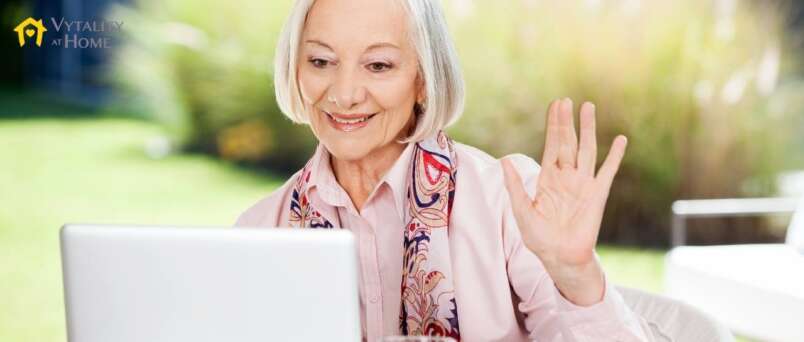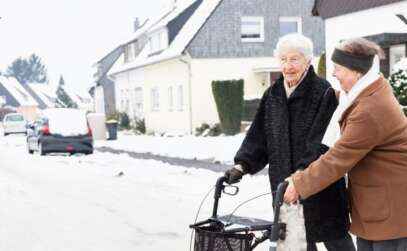Zoom fatigue and seniors
Over the past sixteen months of pandemic, we’ve all had to adapt the way we communicate. Much to the surprise of their adult children, many seniors have wholeheartedly embraced “Zooming”, the now generic term for videoconferencing across the internet.
The ability to see and chat with family and friends on a computer, tablet or phone screen has brought many families together during the pandemic when physical travel and contact was restricted. The technology is fairly easy to use (if not always reliable), but its intensive use in both our work and our private lives has lead to a whole new issue – Zoom fatigue.
Now a group of researchers at Stanford University have examined the psychological effects of spending hours on video calls, and discovered five main reasons why we find Zooming so tiring. These reasons also explain why seniors can find family video calls tiring too, and what you can do to make them less exhausting for your loved one.
1. Lots of close-up eye contact
When you’re on a video chat, you focus on a person’s face more than you would in real life. You’re effectively staring at them for far longer than you would if you were sat on the sofa chatting. This kind of unbroken eye-to-eye contact is both intense and stressful. For many it’s like the stress of being looked at continually when you are speaking in public. Even then, your audience will be looking down and taking notes, shifting their eye positions. Not so in a video call.
2. Faces loom large
In an online video chat, your face could fill most of the screen for your viewers, and the same applies to your face size on their screens. This is particularly true on computer monitors, where both the size and perceived proximity of faces it can make us feel very uncomfortable. Multiple faces on large screens can multiple that feeling.
In a video call, you are often only around 50cm from the screen. Standing closer than 76cm from someone is considered an ‘intimate’ distance and therefore reserved for good friends or family only, according to Edward T. Hall in his foundation work on Proxemics.
As Professor Jeremy Bailenson, founding director of the Stanford Virtual Human Interaction Lab (VHIL) says:
“You’re seeing their face at a size which simulates a personal space that you normally experience when you’re with somebody intimately … When someone’s face is that close to ours in real life, our brains interpret it as an intense situation that is either going to lead to mating or to conflict.”
Let’s just say, neither of those interpretations are ones you want to think about when parents are involved!
3. Seeing yourself in real-time
Video calling platforms often shows your own face in a square or a section on the screen. It is initially useful to check you’re in line with the camera, but it is also a mirror reflecting everything you do, in real time. Ian reality, we don’t see our face when we walk about, and seeing ourselves is very stressful. As the several studies have shown that when you see a reflection of yourself, you are much more self-critical.
As the Stanford team noted:
“There’s lots of research showing that there are negative emotional consequences to seeing yourself in a mirror.”
4. Reduced mobility
Video chats severely curtail your ability to move about as you might during a conversation conducted face to face whilst standing up, or even seated at a table. The need to stay in the centre of the video feed means we move less, and that can make us sluggish both mentally and physically. For seniors sat in their chair, this can also be uncomfortable. So, it is a good idea to literally build in some movement and wriggle time for everyone involved!
5. Cognitive overload
Nonverbal communication is almost as important in a face-to-face meeting as what you actually say. We instinctively read gestures, but in video calls nonverbal signs and body language can be lost due to video cropping. The result is that videos can force us to exaggerate normally subtle gestures (a big thumbs up rather than a subtle nod of the head for agreement.) This exaggeration alone makes video calls far more tiring than in-person chats, or even phone chats, where the absence of nonverbal signals is expected.
If you’re interested, there’s lots more information in the full version of the Stanford research here.
Solutions to Zoom fatigue for seniors
Luckily, you can reduce the effects of Zoom fatigue fairly simply.
- Don’t use full screen for calls. Instead, shrink the call window to a more human scale as part of your monitor screen.
- Sit back from the screen to create some personal space for you and the person you’re calling.
- Hide your ‘self view’ so you’re not seeing your every move and gesture mirrored on screen.
- Put some space between yourself and the camera so you can move about and not get ‘stuck’. Help seniors do this by suggesting they prop up a tablet or phone on a table rather than cradle it in their hands.
- Turn the video off and go to audio only for a while if it’s a long call. Your interaction then becomes a telephone call and you can scratch that itch, look away from the screen, and have a big ol’ stretch without worry! Audio only is less hard work for the brain, and hence less tiring overall.
- Now that restrictions have been relaxed almost completely, why not visit the seniors in your life instead! A Zoom call is no substitute for a face-to-face visit, a hug, and a chat over tea and cake. A visit may take a little longer and more effort, but it’ll mean so much to everyone to ditch the screen for a while.
Seniors and the Vytality app
Our Vytality at Home app has video calling built in, so you can chat with your loved ones and their caregivers during their visit. It’s quick and easy to use, and many adult children clients who live miles from their ageing parents find it gives them the opportunity to “put a face to the name” for caregivers they may not have met in person.
Our app is totally free to download and use, and keeps everyone in the loop regarding your own or a loved one’ care provision. (More details here.)
Home care in Calgary
If you’d like to discuss home care for yourself or a loved one, just contact us to book a consultation.




